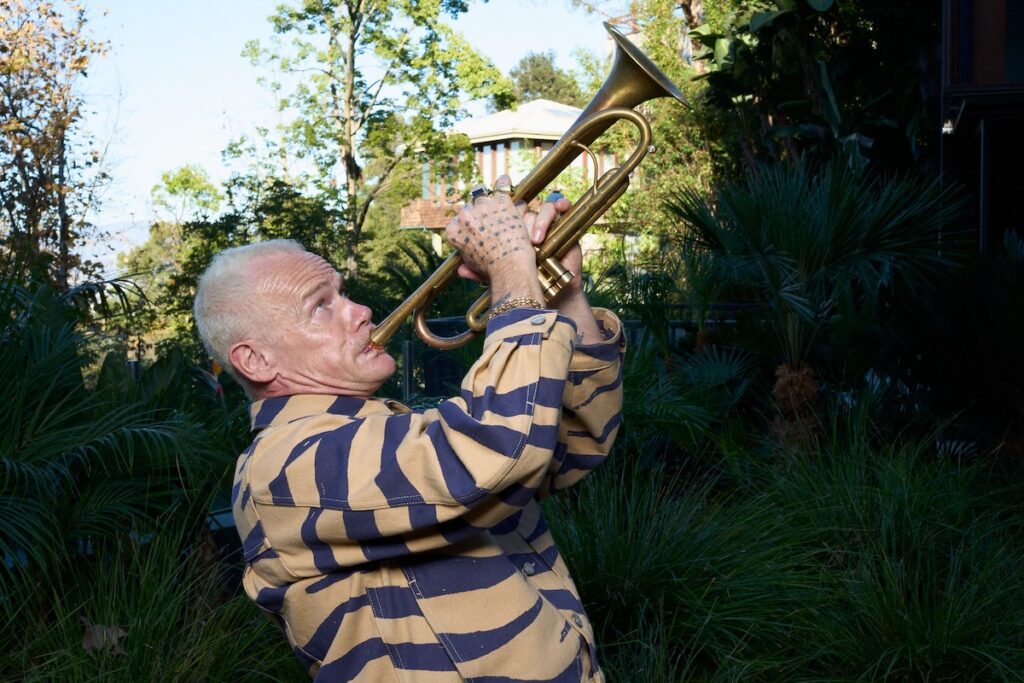
In The Number Ones, I’m reviewing every single #1 single in the history of the Billboard Hot 100, starting with the chart’s beginning, in 1958, and working my way up into the present.
Selling out is an art. It’s not an easy thing to do. When you come from somewhere even slightly left of center, you can’t just suddenly flip a switch and start making mainstream pop music. Instead, you have to walk a delicate line. People can tell when you’re faking, so you have to find a way to inject your actual personality — or, at least, some version of your actual personality — into music that’s engineered to pop off. You have to find a way to get excited about the prospect of becoming a centrist pop figure. And you have to understand and even anticipate the zeitgeist.
Most sellout attempts sound like they’re at least a couple of years out of date when they first arrive. But when Nelly Furtado sold out, she surfed the cultural wave just right. She found a sound that was still emerging, one that would colonize the pop charts over the next few years. In Timbaland, she found a simpatico collaborator who had some similar ideas about rhythm and playfulness. Furtado and Timbaland had already worked together, which helped. The combination might’ve seemed random, but the two of them clicked.
At the moment that they made their first big hit together, Furtado and Timbaland were both coming out of minor career slumps, so they helped each other with the process of reinvention. Together, they nudged pop music in a slightly different direction. That’s one of the secrets to selling out. You can’t just attempt to meet the mainstream where it is; you also have to move the mainstream closer to where you are.
If you weren’t paying close attention to Nelly Furtado’s whole arc, “Promiscuous” must’ve seemed like a wild, out-of-nowhere zag. Furtado first came into the mainstream in the dying days of the whole Lilith Fair MOR singer-songwriter boom. Her music was giddy and eclectic, but it seemed to have some basis in idealistic coffeehouse folk-pop. A few years and one sophomore slump later, she was half-rapping about being horny over a clattering club beat. “Promiscuous,” Nelly Furtado’s first chart-topper, was a clear bid for the mainstream success that she’d seen slip away. But the song also made sense. With “Promiscuous,” Furtado streamlined and foregrounded a few elements that had existed in her music from the beginning. She also made a pretty good song. That was important, too.
It’s probably a bit inaccurate to use the term “selling out” here, but I can’t help myself. Nelly Furtado always made commercial pop music; she went top-10 with her very first single. But when Furtado first arrived, her music gestured toward commonplace notions of integrity. She wrote personal lyrics and sang over acoustic guitars. But pop music changed. Nelly Furtado changed, too. Sometimes, her changes took her toward the pop center. Sometimes, they took her away. I wasn’t into Furtado’s singer-songwriter phase. For me, she got a whole lot better when her music became more crassly commercial. I like flirty lyrics and clubby aesthetics and Timbaland beats. From where I’m sitting, selling out was the best thing that Nelly Furtado could’ve done.
Nelly Furtado comes from Victoria, British Columbia, and she’s the daughter of Portuguese immigrants. (When Furtado was born, Barbra Streisand and Neil Diamond’s “You Don’t Bring Me Flowers” was the #1 song in America. In Canada, it was Donna Summer’s version of “MacArthur Park.”) Furtado started performing early — singing in Portuguese with her mother at four, playing a few different instruments at nine, writing songs at 12. After high school, Furtado and her sister moved to Toronto, and Furtado fell in with the local underground rap scene.
In 1996, an 18-year-old Nelly Furtado made her on-record debut, singing backup on “Waitin’ 4 The Streets,” a track from the Toronto indie-rap group Plains Of Fascination. Soon afterward, Furtado and Plains Of Fascination member Tallis Newkirk formed a trip-hop duo called Nelstar. Based on the music that’s floating around on the internet now, Nelstar fit cleanly within the wave of post-Portishead groups who popped up across the world in the late ’90s. None of those groups, Nelstar included, were anywhere near as good as Portishead, though it’s hard not to feel some lingering affection for the many who tried.
Nelstar didn’t last long, but at a talent show performance, Nelly Furtado was discovered by a couple of members of the Philosopher Kings, an Ontario band who had a few big hits in Canada in the ’90s. (The Philosopher Kings never made the Hot 100, but their 1995 single “Charms” got some US airplay.) Philosopher Kings Gerald Eaton and Brian West had a production team called Track & Field, and they recorded some demos with Furtado and then shopped those demos around to different labels. Furtado signed to DreamWorks in 1999, and her first solo song “Party’s Just Begun (Again)” came out on the soundtrack of the Claire Danes Thai-prison drama Brokedown Palace.
In “Party’s Just Begun (Again),” you can hear some traces of the Nelly Furtado that would make “Promiscuous” seven years later. Furtado is a strange, playful singer. She sings in a needling, nasal soprano, and she’s not even remotely afraid of silliness. There’s a staccato rhythm to her delivery, which sometimes sounds a little like rapping and scatting at the same time. She’s got a cartoonish quality, which can be endearing or obnoxious, depending on your mood. “Party’s Just Begun (Again)” is also a club track, more or less. It’s built on burbling bass and sudden, jagged breakbeats. When Furtado remade the song as “Party” on her debut album Whoa, Nelly! a year later, she completely reworked it. In its second incarnation, the song was still vaguely clubby, but it also had lilting bossa nova guitars and busy tablas.
That’s the version of Nelly Furtado that the world first really got to hear. Broadly, Whoa, Nelly! is a singer-songwriter record, and it got play on alt-rock radio. Furtado was an idiosyncratic vocalist with a bit of a daffy-hippy vibe and a awkwardly eclectic persona that reminded me of Fruitopia commercials. She sincerely loved a whole lot of different kinds of music, and she tried to cram as much as possible into Whoa, Nelly!, which she recorded with the Track & Field production duo. There are traces of Portuguese and Brazilian and Spanish music through Whoa, Nelly!, and there are also a few painful moments where she tries to rap. But lead single “I’m Like A Bird,” the song that really introduced Furtado, was starry-eyed, down-the-middle VH1 pop.
I had absolutely no time for “I’m Like A Bird.” The song just got on my nerves. Listening back now, it’s better than I realized, but it’s still not my vibe. (“I’m Like A Bird” peaked at #9 on the Hot 100. It’s a 4.) Still, Nelly Furtado made for a striking presence, with a face made entirely of acute angles. Her second single “Turn Off The Light” had a little more swagger to it, and its DJ scratches and acoustic guitars were very of-the-moment. I remember “I’m Like A Bird” being more inescapable, but “Turn Off The Light” did better on the charts, peaking at #5. (It’s a 6.)
Timbaland heard something in “Turn Off The Light.” At the time, Timothy Mosley was in the midst of reinventing the sonic palette of rap and R&B, turning it into something weird and jittery and futuristic. Up until now, Timbaland has only been in this column once, for producing Aaliyah’s “Try Again.” But every other R&B producer was either trying to play catchup to Timbaland or reacting against his advancements. In 2001, the year after “Try Again,” Timbaland remixed “Turn Off The Light” reinventing the track as head-warping space-funk.
Around the time of that “Turn Off The Light” remix, Nelly Furtado became a peripheral figure in Missy Elliott and Timbaland’s whole sonic universe. That same year, Furtado and former Number Ones artist Twista appeared on a remix of Missy’s planet-reshaping hit “Get Ur Freak On.” (“Get Ur Freak On” peaked at #7. It’s a 10.) On that remix, Furtado sang in a berserk, out-of-control trill. I used to get so annoyed when that remix would come on the radio; I just wanted to hear the original. Today, though, I have to admit that Furtado does interesting things on the remix, and her style pairs nicely with Twista’s runaway-train speed-rap.
Whoa, Nelly! went double platinum, and Timbaland sampled one of its tracks on a song for one of his proteges. In 2002, Timbaland was trying to break Ms. Jade, a Philly rapper with a tough-as-hell flow. Tim used a piece of Nelly Furtado’s album track “Baby Girl” on Jade’s single “Ching Ching.” Furtado embraced that track and appeared in the video, but I did not like the hook that Tim built out of that sample. I didn’t realize that the “Ching Ching” hit was a sample, and for years, I blamed Furtado for ruining Ms. Jade’s career when Jade’s album Girl Interrupted flopped. (Ms. Jade had bangers. “Big Head“? Come on. She should’ve been way bigger. I have come to realize that this wasn’t Nelly Furtado’s fault, but it took me a minute.)
Nelly Furtado wasn’t just working with Timbaland, though. She was working with a lot of people. After Whoa, Nelly!, Furtado collaborated widely, showing up on tracks with Jurassic 5 and Paul Oakenfold and Juanes and the godawful Canadian rap group Swollen Members. She joined Area: One, Moby’s ill-fated attempt to replicate the spirit of the Lollapalooza tour. In 2003, Nelly Furtado followed Whoa, Nelly! with Folklore, an album that went even harder on its all-over-the-place hug-the-world approach. Folklore flopped hard, selling a quarter of what Whoa, Nelly! had done. All of its singles missed the Hot 100.
After Folklore bricked, Nelly Furtado sure looked like a one-album wonder. Many of Furtado’s ’90s singer-songwriter forebears, the Paula Coles and Meredith Brookses and Natalie Imbruglias of the world, didn’t manage more than one hit album. Uplifting and genre-agnostic Y2K-era peers like Macy Gray didn’t fare much better. Nelly Furtado also had a kid and took a break before returning, which probably didn’t help her prospects. But Nelly Furtado had an ace up her sleeve. She had Timbaland.
When it came time to record her third album, Nelly Furtado worked on tracks with her old Track & Field production team, and she also tried out some ideas with the Neptunes and Scott Storch. Furtado wanted to prove that she could make a successful record — an urgent mission, as DreamWorks, her label, had been absorbed into the Universal label group. Jimmy Iovine suggested that she go to work with Timbaland. At the time, Tim was languishing a bit. Aaliyah had died. Tim and his old creative partner Missy Elliott mostly stopped working together. Some of Tim’s efforts, like Bubba Sparxxx’s 2003 country-rap experiment Deliverance and Brandy’s 2004 LP Afrodisiac, were commercial failures, even though those records are great.
In 2005, Timbaland started working with a new protege, the young Virginia Beach producer Nate “Danja” Hill. Danja helped Tim tweak his sound, but former peers and collaborators like the Neptunes and Scott Storch were surpassing Tim on the charts. Tim’s sonic tricks, once so dazzlingly trippy, had grown stale. That year, the biggest Timbaland-produced hit was the Pussycat Dolls’ not-exactly-inspiring “Wait A Minute,” which peaked at #28. So Timbaland needed Nelly Furtado just as much as she needed him.
Working with Timbaland and Danja on the album Loose, Nelly Furtado found a whole new sound. Former Number Ones artist Gwen Stefani proved that a vaguely alternative artist could reinvent herself as a centrist pop star, and Furtado set out to do something similar. She didn’t fully abandon her freewheeling omnivorous style for Loose, but she turned it into something much more sleek and digestible. You can hear all of that on “Promiscuous.”
Timbaland and Danja produced “Promiscuous,” and Nelly co-wrote it with the two of them and with the Alabama-born rapper and songwriter Tim “Attitude” Clayton. The song has a little of Timbaland’s old sci-fi style. I like the incessant, vaguely haunting synth figure and the way the itchy drums keep jutting in from odd angles. “Promiscuous” also has the same kind of marching-band beat as Gwen Stefani’s “Hollaback Girl,” though the Timbaland version is a lot more sinuous. There are some big, bright ’80s keyboard sounds on the chorus, and the whole thing has a vaguely European sheen to it. In “Promiscuous,” I hear echoes of the hammering EDM that would take over the Hot 100 a few years later, but the song is structured as a flirty back-and-forth that’s not too different from what Shakira and Wyclef Jean brought to “Hips Don’t Lie.”
There’s no judgment in the title of “Promiscuous.” The word “promiscuous” usually has a negative connotation. It’s a shaming word, a tsk-tsk word. But on the song, Nelly Furtado and Timbaland use “promiscuous” almost as a term of endearment. Their two narrators are both horny, and they’re both intrigued by one another. They hit on each other. They make fun of each other. They push up against each other. They’re both hoping that the other one is promiscuous. Neither one of them is trying to fall in love. Instead, they’re both out for a good time, and they’re both figuring out each other’s potential.
“Promiscuous” is not even remotely raunchy. Instead, it’s built from something resembling rom-com banter. On the verses, Timbaland and Nelly Furtado aren’t really singing, but they aren’t quite rapping, either. They’re getting close enough to rapping to sound clumsy, which makes sense. Neither of them was ever any good at rapping. But flirty banter usually is at least a little bit awkward, so their clumsiness fits the feel of the track. Timbaland’s character goes all-in, saying whatever to get in this girl’s pants. Furtado’s character is receptive to that idea, but she has fun playing with him, pulling back and then warming up again a few seconds later.
I like this Nelly Furtado line: “Roses are red, some diamonds are blue/ Chivalry is dead, but you’re still kinda cute.” That’s just classic smart-dumb pop-music writing. Furtado also shouts out an NBA great who came from her Victoria hometown: “Hey, is that the truth or are you talking trash?/ Is your game MVP like Steve Nash?” (Nash got his second straight MVP award in 2006, but I don’t think “Promiscuous” had anything to do with that.) That lyric is goofy, but it’s the funny kind of goofy, and it’s memorable as all hell.
By contrast, most of Timbaland’s lines are pretty flat: “They call me Thomas, last name Crown/ Recognize game, I’ma lay mines down.” (The remake of The Thomas Crown Affair with Pierce Brosnan came out in 1999, and Timbaland does not make a very convincing international art thief, even if he named his Virginia Beach studio after the movie.) I do, however, like the way Tim delivers the line “girl, I’m a freak, you shouldn’t say those things.” He sounds like he’s comically afraid of his own freakiness.
On the song’s hook, Nelly Furtado and Timbaland both stop quasi-rapping and just straight-up sing to each other. For Timbaland, this is not a good idea. Tim couldn’t rap, but he really couldn’t sing. Still, this promiscuous girl and promiscuous boy’s call-and-response pickup lines are catchy enough to get stuck deep in your head. “Promiscuous” is a light, fluffy little number, and it arrived just in time to become a serious summer jam.
Nelly Furtado actually released two summer jams before Loose came out. In the US, “Promiscuous” was the single. In Europe, however, Furtado led off the album with a different Timbaland collaboration. “Maneater” was less rap-adjacent, more indebted to ’80s dance-pop. (The song didn’t sample or interpolate the Hall & Oates hit of the same title, but it was obviously supposed to remind the world of that one.) Furtado’s “Maneater” went to #1 in the UK, and it was a serious smash around the world. Shortly after “Promiscuous” reached #1 in America, “Maneater” got its own push over here, and it eventually peaked at #16.
With the double shot of “Promiscuous” and “Maneater,” Nelly Furtado pulled off her successful sellout move. She made fun, trashy songs for a fun, trashy age. “Promiscuous” played in the background on reality shows and Gossip Girl, and people stopped thinking of Furtado as a singer-songwriter. The transition wasn’t entirely smooth. Furtado got plenty of internet hate for acting publicly horny, and plenty of critics did not adjust gracefully to the new image. But “Promiscuous” was likable enough to overcome any backlash. In the end, it’s hard to argue with a track that makes people dance, and “Promiscuous” did that.
In the “Promiscuous” video, you can see some hints of what would come down the pike in the next few months. Director X, then still known as Little X, filmed the clip, and it’s heavy on dancing. Timbaland had gotten really into bodybuilding and had lost a ton of weight before appearing in the video. Most of the time, he looks like he’s had his head badly PhotoShopped onto a weightlifter’s body, even though he’s still making his trademark rubbery faces. Nelly Furtado looks incredible. She never struck me as being hot when she was like a bird, but in the “Promiscuous” clip, that changes.
There are some noteworthy cameos at the end of the “Promiscuous” clip. For one, there’s Keri Hilson, a singer and songwriter who’d done a ton of work with Timbaland and who was just about to make a push into pop stardom. (Danja co-produced Hilson’s highest-charting single, the 2009 Kanye West/Ne-Yo collab “Knock You Down,” which peaked at #3. It’s a 7.) And then there’s Justin Timberlake, who gets about four seconds of screen time and who still comes off as an utterly charming scene-stealer. Remember when it was exciting to see Justin Timberlake randomly show up anywhere?
That Justin Timberlake cameo was a teaser. Timberlake had already worked with Timbaland before he appeared in the “Promiscuous” clip. Timbaland had produced Timberlake’s mercilessly petty 2002 masterpiece “Cry Me A River,” which peaked at #3. (It’s a 10.) But when JT showed up in the “Promiscuous” video, Timberlake and Timbaland were cooking up something new, and it would soon arrive in a very, very big way. Nelly Furtado will appear in this column again. So will Timbaland. And we will see the results of Justin Timberlake’s Timbaland collaboration very soon.
GRADE: 6/10



